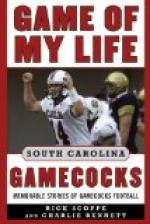But the overseer did not like the idea of having me work at the trade which was my choice. He said to mistress, “That is the worst thing you can do, madam, to allow a negro to have his choice about what he shall do. I have had some experience as an overseer for many years, and I think I am able to give a correct statement about the nature of negroes in general. I know a gentleman who allowed his negroes to have their own way about things on his plantation, and the result was that they got as high as their master. Besides that, madam, their influence rapidly spreads among the neighbors, and if such should be allowed, South Carolina would have all masters and mistresses, and no servants; and, as I have said, I know somewhat about the nature of negroes; I notice, madam, that this boy will put you to a great deal of trouble unless you begin to subdue him now while he is young. A very few years’ delay will enable him to have a great influence among his fellow negroes, for that boy can read very well now, and you know, madam, it is against the law for a negro to get an education, and if you allow him to work at the carpenter’s trade it will thus afford him the opportunity of acquiring a better education, because he will not be directly under the eye of one who will see that he makes no further advancement.”
Then mistress asked me, “Can you read, Jacob?” I did not want her to know that I had taken notice of what they were saying, so I answered, “I don’t know, ma’am.” The overseer said, “He does not know what is meant, madam, but I can make him understand me.” Then he took a newspaper from his pocket and said to me, “Can you say these words?” I took the paper and began to read, then he took it from me.
Mistress asked when I had learned to read and who had taught me. The overseer did not know, but said he would find out from me. Turning to me he took the paper from his pocket again, and said, “Jacob, who told you to say words in the book?” I answered, “Nobody, sir; I said them myself.” He repeated the question three or four times, and I gave the same answer every time. Then mistress said, “I think it would be better to put him to trade than to have him in the field, because he will be away from his fellow-negroes, and will be less liable to influence them if we can manage to keep him away.” The overseer said, “That might be true, madam, but if we can manage to keep him from gaining any more education he will eventually lose what little he has; and now, madam, if you will allow me to take him in hand, I will bring him out all right without injuring him.” Just at this juncture a carriage drove up to the gate, and I ran as usual to open it, the overseer went about his business, and mistress went to speak to the persons in the carriage. I never had a chance to hear their conclusion.




